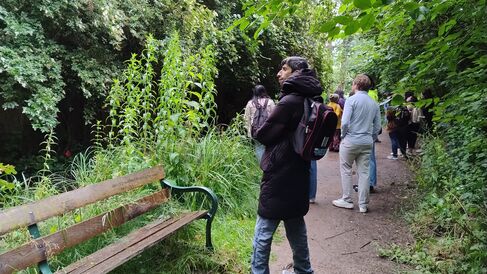
The opportunity to join a Summer School with the Cambridge Interfaith Programme is limited by capacity as well as other considerations. As a result, we ask potential participants to tell us a little about themselves and their interests, and what they hope to do subsequently. Among those who joined our joint programme this summer was Toqueer Quyyam, who told us about his experience volunteering.
Toqueer is proactive in his outreach, and had been involved in facilitating energy assessments for 28 buildings and leading group discussions in diverse settings. This was done as part of as the Birmingham Council of Faiths’ environmental project, Footsteps. Toqueer also volunteers with Birmingham and Black Country Wildlife Trust, brokering meaningful connections between a scout group at a local mosque and the Small Heath Eco Park—an achievement described in more detail on his personal blog (linked below).
In anticipation of attending, Toqueer shared his intention to take his learning back to the local communities. He wrote: “As a someone from a minority background I can readily reach out to others from a similar background and involve them in interfaith and environmental activities.”
Toqueer went on to chronicle the experience on his blog, where the following reflections were first published:
A 5-day course
I participated in a five-day interfaith course at the University of Cambridge in collaboration with LSE Religion and Global Society Research Unit. I am grateful for the opportunity and admire the universities’ historical significance and desire to relate to the world of today.
As a British Muslim of Kashmiri descent, I have always been surrounded by diverse beliefs and cultures, fostering a desire for knowledge. The course at Cambridge was a great opportunity to extend this.
Day-by-day
Day 1 | I focused on getting to know fellow participants, including PhD students from various countries. This was very interesting and illuminating. I was struck by the Christian traditions present in the university. These traditions have been privileged and I am moved to think about the responsibility that privilege requires.
Day 2 | I engaged in theoretical discussions and explored the intersection of belief systems and nature, including poetry. I had already been aware of the power of poetry and music to create friendship and understanding; this was an opportunity for me to share my story and also to listen to other people’s reflections through their art forms.
Day 3 | I collaborated on a project aimed at making the Hajj pilgrimage more environmentally friendly, highlighting the issue of waste in Saudi Arabia. The benefit of collaborating with people of other faiths on this topic, was that I as a British Muslim was able to listen to challenges from outside perspectives. This provoked my thinking and gave me some new ideas, such as whether the ihram (pilgrimage clothes) could be borrowed. Also in Saudi Arabia, an oil-rich country, how can a Muslim hold to his beliefs and practice? The educational guide we produced will help people in the UK to think about their individual responsibilities.
We also visited a community garden project by the river Cam. I was struck by the care that the diverse volunteers showed for the natural world and was impressed by how modern technology was used so that people could learn about trees through the use of QR codes.
Day 4 | I visited the Central Mosque, appreciating its architectural beauty and the integration of modern and historical elements. The mosque's design was inspired by the Quran and aimed to inspire other places of worship. As a British Muslim I value the opportunity of people of all faiths and none to visit Cambridge Central Mosque. There is a sense of peace, contemplation. There is a library. People of all faiths are welcome. As the first purpose-built green mosque in Europe, it is a sign of hope for all the communities in Cambridge and elsewhere in the UK.
Day 5 | We focused on presenting our findings from the course and fostering friendships with participants, emphasising the importance of interfaith dialogue.
Key takeaways
- I learned the value of diverse traditions and practices, the importance of environmental stewardship, and the potential for interfaith collaboration. As participants, we expressed a desire to share our learnings through workshops that could benefit people of all faiths.
- The interfaith course at Cambridge provided a rich environment for learning and collaboration among individuals of diverse backgrounds.
- The experience reinforced the idea that different faiths share common goals, particularly in terms of environmental care and peaceful coexistence. I aim to leverage my experience to promote interfaith understanding and environmental awareness in their community, highlighting the importance of learning from one another's traditions and practices.
- I want to share this knowledge back in Birmingham by sharing my knowledge with others involved in interfaith in various settings.
Suggested further reading
The following links bring together suggestions from Toqueer and links to his own work.
About the 2024 Summer School: Religion and Climate Futures
Cambridge Central Mosque, Europe's first eco-mosque (cambridgecentralmosque.org)
LSE Religion & Global Society research unit (via lse.ac.uk)
River Cam and Midsummer Common (midsummercommon.org.uk)
Follow Toqueer’s work on his Green Blog (via wordpress.com)
And check out Footsteps, the Birmingham project that supported Toqueer’s participation (footstepsbcf.org.uk)
